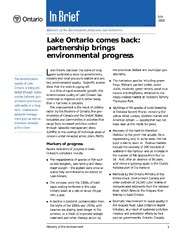
In brief : Lake Ontario comes back, partnership brings back environmental progress PDF
Preview In brief : Lake Ontario comes back, partnership brings back environmental progress
In Brief July 2000 Ministry of the Environment programs and initiatives Lake Ontario comes back: partnership brings environmental progress Lake Ontario has been the scene of long the provincial, federal and municipal gov term partnership work by governments, ernments. The environmental industry and local groups to restore and pro ● The numerous species, including green quality of Lake tect environmental quality. Scientific studies frogs, Midland painted turtles, wood show that the work is paying off. Ontario is being pro ducks, muskrats, green herons, great blue In a time of rapid economic growth, the tected through collab herons and kingfishers, attracted to the environmental quality of Lake Ontario has oration between gov newly-created habitat at Toronto’s Tommy continued to improve and is better today ernments and the pri Thompson Park. than it has been in decades. vate sector in a long The improvement is the result of collabo ● Sightings of 64 species of birds breeding term, international ration by the Province of Ontario, the gov at Oshawa Second Marsh, including the lakewide manage ernments of Canada and the United States, yellow billed cuckoo, northern harrier and ment plan as well as industries and communities in activities that American bittern — species that had not individual remedial range from increased pollution control been seen at the marsh for years. action plans. through lakewide management plans ● Recovery of the hard-hit Hamilton (LaMPs) to the cleanup of individual areas of Harbour to the point that aquatic life is concern under remedial action plans (RAPs). regenerating and, in some areas, the har Markers of progress bour is safe to swim in. Positive markers include the recovery of 200 hectares of Recent indicators of progress in Lake wetland in the harbour and an increase in Ontario’s comeback include: the number of fish species from four to ● The reappearance of species of fish such 16. And, after an absence of 50 years, as lake sturgeon, lake herring and deep wild celery is growing again in the Cootes water sculpin – the sculpin were once so Paradise part of the harbour. scarce they were feared to be extinct in ● Removal by the Ontario Ministry of the Lake Ontario. Environment, Environment Canada and ● The increase, since the 1980s, of bald other partners of 10,500 cubic metres of eagle nesting territories in the Lake contaminated sediments from the Welland Ontario basin at a rate of about 20 per River, which flows to the Niagara River cent a year. leading to Lake Ontario. ● A decline in bacterial contamination from ● Dramatic improvement in water quality in the highs of the 1960s and 1970s, with the Niagara River, Lake Ontario’s largest beaches are staying open longer in the tributary, as a result of sustained pollution summer, as a result of improved sewage cleanup and prevention efforts by four treatment and other cleanup action by partner governments, Ontario, Canada, Ministry of the Environment 1 In Brief the United States and New York State. Note: Scientific analyses of water quality, studies Further information is available in of contaminant levels in fish and shellfish Environment Canada’s Third Report of and tests of river sediments confirm the Progress Under the Canada-Ontario Agreement improvements, which include declines of Respecting the Great Lakes Basin Ecosystem 50 per cent or more overall in critical pol 1997-1999 at the Web site lutants and more than 98 per cent on the http://www.cciw.ca/green-lane/coa/third Canadian side. progress-report/intro.html. ● An increase in populations of birds that nest in colonies, as revealed in a recent For more information: Lake Ontario-wide census by the Ontario Ministry of Natural Resources, the Ministry of the Environment Canadian Wildlife Service and the New Public Information Centre York State Department of Environmental (416) 325-4000 or Conservation. toll-free 1-800-565-4923 Internet: http://www.ene.gov.on.ca ● Steep declines in the volume of phospho rus and sediment entering Lake Ontario tributaries. This includes the elimination, since 1994, of 9,600 kilograms of phos phorus and 6,000 kilograms of sediment that had been entering the Bay of Quinte watershed. This feat has been achieved through a major upgrading of sewage plants at Belleville, Quinte West (Trenton and Frankford), Prince Edward (Picton), and Warkworth as well as by other reme dial actions in the watershed. Ministry of the Environment PIBS: 3986E 07 - 2000 2 © Queen’s Printer for Ontario, 2000
